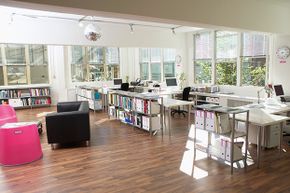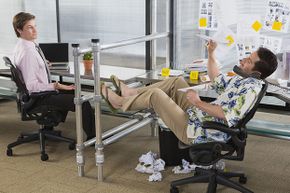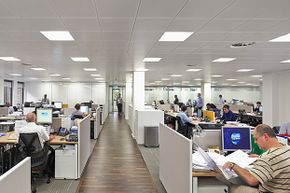A low chattering thrums through the air, occasionally punctuated by loud laughter, coughs and grunts. Suddenly the spicy smell of gyros fills the air, layered on top of a sharp, eggy scent. This might be a description of your company around lunchtime, if it's one of the 70 percent in the U.S. with an open office plan, according to the International Facility Management Association. Open offices are the norm in America today and are generally defined as a large, open space where employees have desks but no walled offices, or where "offices" are delineated merely by low partitions [source: Kaufman].
The movement toward open plan offices began with Silicon Valley employers.Soon companies everywhere were following the blueprint, which is less costly than having separate offices, or even cubicles, for every employee. From the management side, open offices have other perks beyond cost savings: Bosses can easily keep tabs on their employees — no need to wonder what Dylan is really doing at his desk all day. Gazing out over an open plan office, with workers chatting in groups and buzzing around, gives the picture of a busy, productive place. Plus, the workspace can be quickly reconfigured whenever a business needs to up-size or downsize [source: Church].
Advertisement
The problem is most workers strongly dislike them, studies have shown. Employees have little privacy; they can't concentrate due to loud noise levels; illnesses spread quickly; and workers can't control lighting, temperature, sounds and smells [source: Yonatan]. Studies also show if you have loads of disgruntled employees, they'll be much less productive. One survey reported lost productivity due to noise distraction was doubled in companies with open vs. private offices [source: Kaufman].
Employers apparently don't care. So if you find yourself dreading heading to work at your open plan office, try our strategies, designed to help make your workdays be less stressful and more productive.










